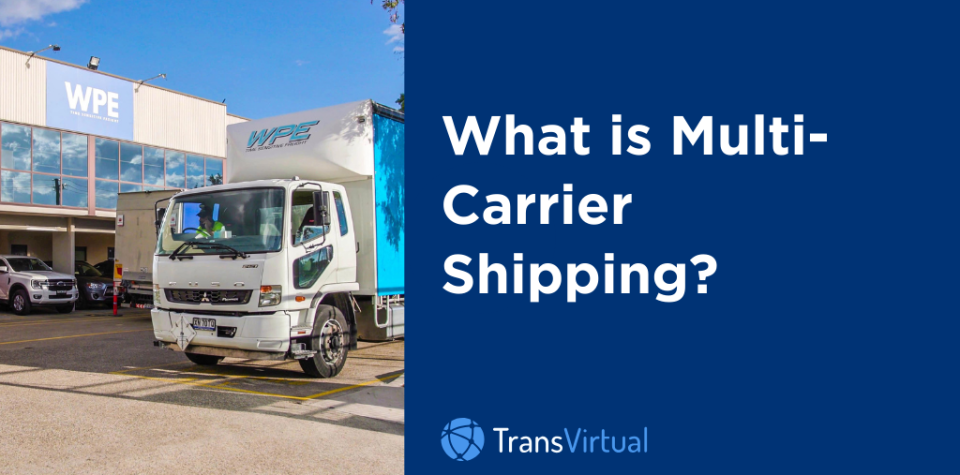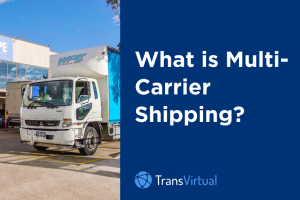Table of Contents
What do you do when you need a new shirt?
Some people might go straight for a brand they already like – maybe they’ve bought shirts there before, or even a pair of jeans. Maybe they buy all of their clothes from that one store. Perhaps more common, we prefer to buy shirts from Kmart, but H&M has a better selection of sweaters.
All in all, we mostly recognise that when we stick to a single provider, we can be losing out on a better quality product or a better deal. Many believe that the same is true for shipping: by limiting ourselves to a single carrier, we may be cutting ourselves off from options that would suit us better.
In action, this principle of ‘shopping around’ is called multi-carrier shipping, and we use it to ensure reliable deliveries or to connect with regional carriers.
Multi-carrier shipping can provide a competitive advantage in the shipping industry by offering more efficient, transparent, and consumer-centric services. Today, we’re taking you through everything you need to know about multi-carrier shipping: what it is, the pros and cons, and how it differs from other methods.
What is Multi-Carrier Shipping?
As the name implies, multi-carrier shipping solutions are the opposite of single carrier shipping – which is where you rely on a single carrier / freight division to fulfil all of your shipping needs.
Multi carrier shipping refers to a strategic approach for businesses to fulfill their shipping needs by utilizing multiple carriers, providing flexibility, cost optimisation, and improved carrier performance.
You may also have heard of its other name, ‘Aggregate shipping’. In a multi carrier solution, software compares a range of different carriers’ quotes and benefits in order to find the best fit for your particular shipment. This same software usually tracks the freight proceedings.
How is Shipping From Multiple Carriers Different?
Single carrier shipping relies either on the use of a business’ personal fleet or a private agreement with a single carrier, whereas multi-carrier solutions uses a web of carriers to fulfil a business’ shipping needs.
Companies fall into three categories regarding shipping solutions:
-
Enterprises: Can sustain operations with their own fleets.
-
Mid-sized companies: Benefit most from multi-carrier shipping providers.
-
Small companies: Have limited demand, so a single carrier is sufficient.
Mid-sized companies choose multi-carrier solutions because:
-
They need more flexibility than a single carrier can offer.
-
Their shipping demands are too complex for one carrier but not large enough for an in-house fleet.
Multi-carrier shipping providers offer these companies a range of benefits and the flexibility they require.
Using a multi-carrier platform provides access to multiple carriers in one place and the ability to switch carriers during disruptions, ensuring efficient and reliable shipping.
The Benefits of Multi-Carrier Shipping
Shipping from multiple carriers can be an excellent way for businesses to improve efficiency and minimise risk across their operations. We’ve listed out some of the main advantages of this method below:
-
Optimised Service Type
No carrier service can realistically be big enough to support the full range of shipping options you may want or need access to, such as next day package delivery, delivery to remote locations, shipping, trucking, and many more services.
For businesses that ship different products or to different locations, the ability to shop around for the right carrier can be very valuable. It allows you to both weigh up the expertise provided by the carrier and their quote against competitors to find the right fit.
Therefore, multi-carrier shipping gives you the choice to entrust a specialised carrier with the job that you need done – allowing for both more flexibility and ability to meet the demands of customers.
Additionally, offering a range of delivery services can significantly improve customer satisfaction by catering to diverse needs and preferences.
-
Less risk of disruption
A single carrier option places all your eggs in a single basket. So, when your sole carrier faces delays, disruptions, or any of the common nuisances that plague the transportation industry – the entirety of your operations will be impacted.
In a multi-carrier system, risks are reduced. They are limited to one area and can be easily managed by changing routes. This boosts your business’s flexibility and performance.
-
More control
We know that every time an order is placed, our reputation is on the line with that customer – and it’s up to us to fulfil their expectations and provide great service. Multi-carrier shipping allows for much more control over the service that we provide, as we are able to exercise more choice in which carrier we choose for which operation.
Optimising shipping operations can lead to better delivery performance and reduced delivery costs, enhancing overall efficiency.
-
Data consolidation
Multi-carrier shipping requires a robust and intuitive transport software to pull off. The platform also collects data which can be useful for future analysis and optimisation. Leveraging the data collected allows businesses to understand the strengths and weaknesses within their own processes and the particular carriers they choose, allowing them to fine tune their operations and gain efficiency over time.
Disadvantages of Multi-Carrier Shipping
Going for a multi carrier solution presents its own challenges. Below are a few of the reasons that may lead you to look into other methods:
-
Greater logistical demands
Coordinating between multiple carriers, even with a multi carrier shipping system to aid in the process, does come with big logistical demands. For those with small teams already stretched thin, it may not be the time to make the switch.
-
Price
For smaller businesses, shipping with multiple carriers can be a less cost effective choice. Multi-carrier shipping requires specific software to be done well and, depending on the provider, this can pose a barrier for entry to some businesses. Additionally, small businesses often benefit from discounts given by individual providers in exchange for an exclusive relationship – which can widen profit margins considerably. Furthermore, managing shipping costs due to inflation in fuel and labor costs can be challenging, making it essential to optimize transportation spend.
-
Not fit for every business
There’s no one size fits all solution in the shipping industry.
For instance, businesses with very localised shipping needs, infrequent orders, or needs that generally rely on one system or method of transportation may be entirely satisfied with a single carrier solution which offers the specific service they require.
The Right Multi Carrier Shipping Software Solution For You?
Although it’s not perfect for everyone, multi-carrier shipping is a great choice for businesses seeking to improve their efficiency and reliability. Selecting the right multi-carrier shipping solution is crucial to optimising operations and improving customer satisfaction.
If you want to learn more shipping strategies and other guides that’ll help you attain operational efficiency, make sure to check out our blog.


